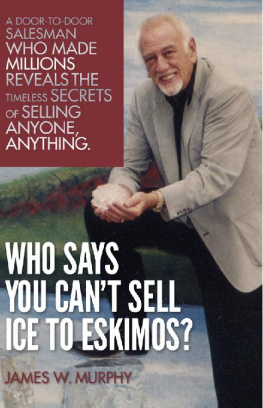Copyright 2019 Blain Henshaw
All rights reserved. No part of this publication may be reproduced or used or stored in any form or by any means graphic, electronic or mechanical, including photocopying or by any information storage or retrieval system without the prior written permission of the publisher. Any requests for photocopying, recording, taping or information storage and retrieval systems shall be directed in writing to the publisher or to Access Copyright, The Canadian Copyright Licensing Agency (www.AccessCopyright.ca). This also applies to classroom use.
Library and Archives Canada Cataloguing in Publication
Title: The peddlers: the fuller Brush Man, the Lords of Liniment and door to door heroes in
Nova Scotia and beyond / Blain Henshaw.
Names: Henshaw, Blain, 1946- author.
Identifiers: Canadiana (print) 2019005204X | Canadiana (ebook) 20190052104 |
ISBN 9781988286785 (softcover) | ISBN 9781988286792 (ebook)
Subjects: LCSH: PeddlingNova ScotiaHistory. | LCSH: PeddlersNova ScotiaHistory.
Classification: LCC HF5459.C3 H46 2019 | DDC 381/.109716dc23
Cover image: Fred Manzer and his grocery truck. Photo courtesy of the Manzer family.
Cover design: Gail LeBlanc
Pottersfield Press gratefully acknowledges the financial support of the Government of Canada for our publishing activities. We also acknowledge the support of the Canada Council for the Arts and the Province of Nova Scotia which has assisted us to develop and promote our creative industries for the benefit of all Nova Scotians.
Pottersfield Press
248 Leslie Road
East Lawrencetown, Nova Scotia, Canada, B2Z 1T4
Website: www.PottersfieldPress.com
To order, phone 1-800-NIMBUS9 (1-800-646-2879) www.nimbus.ca
Printed in Canada
Pottersfield Press is committed to protecting our natural environment. As part of our efforts, this book is made of material from well-managed FSC-certified forests and other controlled sources.
This book is dedicated to my children,
Kimberley and Christopher.Foreword
The best known peddler in Nova Scotia was Sam Slick the Yankee Clock Peddler. He was noted for his wry wit, folksy humour, wise sayings, and barbed political commentary as he sold his wares across the province. But Sam Slick was only a fictional peddler, created by writer and political commentator Judge Thomas Chandler Haliburton in 1836.
This book is about real peddlers the nineteenth-and early twentieth-century people who went door-to-door selling everything from brushes and cleaning compounds to horse liniment and cough syrup. In an earlier time in the nineteenth century some of the shadier ones especially those who sold liniments, elixirs, and other cure-all potions were often referred to as snake oil salesmen. But this story is not about snake oil salesmen, either; its about people, often from humble beginnings, who were tenacious, hard-working and, ultimately, successful with their own ideas and on their own terms.
One of the early peddlers in Nova Scotia was William E. Schwartz of Halifax. He was the first person in Canada to sell pure spices. Prior to his initiative, only compound spices, such as ginger mixed with flour or cornmeal, were sold. The famous W.H. Schwartz and Sons coffee and spice purveyor started around 1840-1841 as a coffee grinding business in north-end Halifax. William E. was the son of the company founder, W.H. Schwartz, who was the son of a German immigrant. The younger Schwartz, W.E., imported a bicycle from England that had pneumatic tires, the first of its type in Nova Scotia. It was state-of-the art. On this rubber-tired bicycle, young Schwartz travelled throughout Nova Scotia, selling the companys bottled spices a pedalling peddler, so to speak.
I first became aware of peddlers in the summer of 1951 when I was just five years old. It was in Weymouth North, Digby County, where I was spending a week or so with my grandparents on their small farm. Grandma and Pup Doty never travelled far from that little place they didnt have a car. Most of what they needed was right there on the farm anyway; they had hens and chickens, a couple of pigs, a milk cow, a team of oxen, a small woodlot, and, most important, a garden that yielded fresh vegetables, strawberries, and herbs. In that respect, they were fairly independent pretty much the same as everyone else in rural Nova Scotia in those days.
But once a week, what everyone called Freddy Manzers grocery truck rolled into the yard. It was a pickup truck with a large covered frame on the back, filled with dry goods and household supplies, things like mops and brooms, galvanized buckets, boxes of soap flakes, Corn Flakes and other cereals even candy for kids like me. It was a store on wheels. Inside there was wooden shelving with small rails to hold the cereal and soap flake boxes, jars, small tubs, and other containers in place when the truck was moving.
My grandmother would take me aboard while she selected the supplies soap powder, condensed milk or other canned goods she might need until the trucks next visit. I remember the first time I was on the truck she bought me a little toy corn broom that, for some reason, caught my fancy. She paid cash to Freddy, the driver and owner of the truck, who made change from a small on-board cash box.
Before he drove away, he would ask if there was anything she needed that wasnt on the truck that particular day. If there was, he would make note of it and bring the item the following week. And then Manzers Grocery Truck would leave the Doty yard and drive to the next farm, a quarter of a mile or so up the old dirt road where the process would be repeated at the neighbours place.
It all seemed a rather exciting and novel idea to me that the store actually came to the customer, rather than the customer going to the store. When I went back home to Deep Brook some thirty miles from Weymouth, I took more notice of this way of doing business during that era in Nova Scotia.
There were several peddlers who called at our place regularly when I was a kid. A local butcher, Ralph Jefferson from Bear River East, had a small refrigerated box on the back of his pickup truck. He came through Deep Brook once a week with beef and pork. And, seasonally, Harold Simms from Marshalltown in Digby County supplied fresh fish in the same way. In particular, I remember those delicious big fresh mackerel he always seemed to have in August. There was also a lady from Waldeck, a couple of miles up the hill from Deep Brook who peddled fresh eggs. A seasonal vendor, she would walk the entire route until the eggs were all sold and then, usually after having a meal at someones home in Deep Brook, she would often get a drive back to Waldeck with the Harvey family, who delivered the rural mail with an old army jeep.
In late June, generally when the strawberries in our garden were at their best, I would look forward to the arrival of a lovely Mikmaw lady, Mrs. Pineo from Lequille, near Annapolis Royal. She would make the long walk to Deep Brook over a day or two, selling her handcrafted baskets door-to-door along the way. She would arrive just in time to have lunch with us and seemed to especially enjoy our garden-fresh strawberries with cream from our big Hereford cow, Red. She would arrive laden with dozens of beautifully handwoven multicoloured splint baskets, no two alike and each of them works of art that were hand-tinted from dyes she had made herself. My mom and dad always bought one or two of her elegant baskets, one of which is now owned by my daughter.













